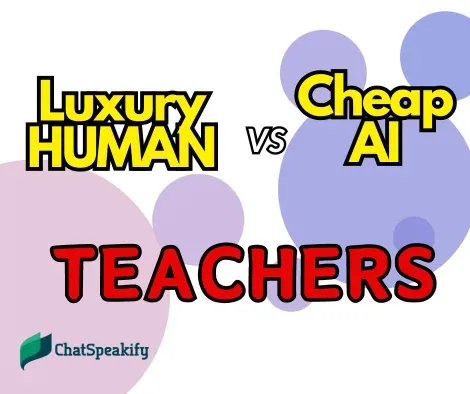Imagine a cozy suburban classroom where Ms. Thompson is in her element. She’s not just an experienced English teacher but a master storyteller. Today, she shares an insightful anecdote about how she helped a student named Carlos overcome his struggles with English grammar. This story inevitably leads us to a profound question: Can the increasingly prevalent Artificial Intelligence (AI) in education truly replace teachers like Ms. Thompson, who bring such a human touch to their teaching?
The Magic of Human Teaching: A Perfect Blend of Experience and Empathy
What sets human teachers apart is their ability to infuse their rich experience, deep empathy, and flexible teaching methods into their lessons. Picture Ms. Thompson noticing Carlos’s puzzled expression. She can immediately adjust her teaching strategy, perhaps using a vivid metaphor or an engaging example to clarify the difficult point. This real-time response and adaptation is something current AI systems struggle to match.
Moreover, human teachers play the roles of mentors and role models. Their ability to forge deep connections and provide motivational encouragement is unparalleled. Ms. Thompson’s individualized approach with Carlos exemplifies how human teachers can nurture a student’s potential, going beyond mere instruction to inspire a love for learning.
Expertise in Context: The Art of Teaching
Human expertise transcends textbook knowledge. Experienced teachers like Ms. Thompson have mastered the art of teaching, often developing innovative methods tailored to their students’ needs. They can draw from a vast repertoire of pedagogical strategies, adapting them to the unique dynamics of each classroom.
For instance, Ms. Thompson might use a pop culture reference to explain a complex grammatical concept, making it more relatable and memorable for her students. This adaptability and depth of understanding make human teachers invaluable in the learning process.
The AI Revolution: Efficiency and Accessibility in Education
On the other hand, AI teachers are ushering in a new era of efficiency and personalized learning. Imagine an AI system that can provide immediate, accurate feedback and adapt to each student’s learning pace. It’s like having a tireless tutor available 24/7, ready to explain the difference between “their,” “there,” and “they’re” for the hundredth time without losing patience.
AI’s strength lies in its ability to process and learn from massive amounts of data, continuously improving its functionality. Studies have shown that adaptive learning technologies can significantly increase students’ engagement and retention rates. This data-driven approach ensures that students get the help they need when they need it, making learning more efficient and accessible.
The Personal vs. The Practical: Finding the Balance
While AI tools offer unprecedented accessibility and personalized learning paths, they lack the human touch that can inspire and emotionally support students. AI cannot share enriching life experiences or offer the nuanced understanding that comes from years of teaching and human interaction.
In cases like Carlos’s, where personal encouragement and tailored explanations are critical, human teachers are irreplaceable. However, AI can serve as a powerful complement to human educators, providing additional resources and support, especially in areas where there may be a shortage of qualified teachers.
Integrating the Best of Both Worlds: The Future of Education
The future of education is likely to be a hybrid approach that leverages the strengths of both human teachers and AI. Imagine Ms. Thompson armed with AI’s data-crunching power. She could know exactly when Carlos is struggling with a concept before he even raises his hand. AI could provide personalized practice exercises while Ms. Thompson offers the encouragement and real-world context that brings the lesson to life.
Human teachers will continue to provide emotional support, mentorship, and adaptability, while AI can offer personalized practice, immediate feedback, and supplemental instruction. This combination promises to create a more effective and inclusive educational landscape.
Conclusion: It’s Not About Replacing, It’s About Enhancing
In the ongoing debate between human and AI teachers, it’s crucial to recognize that it’s not about choosing one over the other. Instead, it’s about integrating both to enhance the learning experience. Human teachers bring empathy, experience, and a personal touch that is essential, while AI offers efficiency, accessibility, and personalized learning that can revolutionize education.
As we move forward, the synergy between human ingenuity and artificial intelligence promises to create an educational environment that is more responsive, more inclusive, and more effective than ever before. Whether it’s through the warm guidance of Ms. Thompson or the precise feedback of an AI assistant, the ultimate goal remains the same: to inspire and educate the learners of today and tomorrow.
In this exciting new world of education, the question isn’t whether AI will replace human teachers, but how we can best combine their strengths to create the most impactful learning experience for every student.
